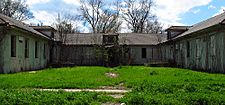Afro-American Sons and Daughters Hospital facts for kids
Quick facts for kids Afro-American Sons and Daughters Hospital |
|
|---|---|

Afro-American Sons and Daughters Hospital, 2013
|
|
| Geography | |
| Location | Mississippi, United States |
| Organization | |
| Funding | Private |
| Hospital type | General |
| History | |
| Closed | 1966 |
The Afro-American Sons and Daughters Hospital was an important hospital in Yazoo City, Mississippi. It was also known as the Afro-American Hospital. Built in 1928, it helped many people. In 2006, it was added to the National Register of Historic Places, which means it's a special historical site.
Contents
What Was the Afro-American Sons and Daughters?
The Afro-American Sons and Daughters was a special group, like a club or society, in Mississippi. It was one of the most important groups for Black people in the state.
How the Group Started
This group began in 1924. By the 1930s, it had grown very large, with about 35,000 members.
Who Founded the Group?
The person who started the group was Thomas J. Huddleston, Sr.. He was a successful Black businessman. He believed in the idea of "self-help," which meant people should work together to improve their own lives and communities.
The Hospital's Purpose
In 1928, the Afro-American Sons and Daughters group opened the Afro-American Hospital. They wanted to offer affordable healthcare to their members.
Healthcare for the Community
Dr. Lloyd Tevis Miller was the first director of the hospital. The hospital was very important for Black people in Mississippi. It offered many services, including major and minor surgeries.
A High Standard of Care
Compared to other hospitals serving Black communities in the Southern United States at that time, the Afro-American Hospital had a very low death rate. This showed it provided excellent care.
Why the Hospital Closed
The hospital stopped operating in 1966. The Afro-American Sons and Daughters group also ended around the same time.
Challenges the Hospital Faced
Several things made it hard for the hospital to keep going:
- New rules and laws made it more difficult to run.
- More healthcare options became available from the government and other groups.
- Many younger Black members moved away from the South to the North. This meant fewer people were paying membership fees to support the hospital.
A Family Legacy
Interestingly, Thomas J. Huddleston, Sr.'s grandson is Mike Espy. Mike Espy later became a member of the U.S. House of Representatives and also served as the U.S. Secretary of Agriculture.

